Treasurer Scott Morrison says the government’s planned ‘open banking’ regulatory regime would give customers greater access and control of their data and would “revolutionise” the financial services sector.
People would soon have the right to take their data from one financial institution or FinTech to another when they change providers, easily and seamlessly, much like a customer can take their telephone number with when they change telco.
“Granting third-party access to a customer’s data will allow rival providers to offer competitive deals, products that are tailored to individual needs, and enhanced services that simplify the choices customers face when accessing banking services,” Mr Morrison said.

“It should simplify the process of switching between banks and help to overcome the ‘hassle factor’ that sees customers stay with their current bank even in the presence of more competitive deals elsewhere.”
The new open banking regime rules are outlined as part of a 158-page Review into Open Banking.
The report, authored by partner of King and Wood Mallesons Scott Farrell, includes 50 recommendations on what is the most appropriate regulatory model for open banking in Australia; what data should be shared and with whom; what privacy and security safeguards are needed for customers; how data should be transferred; and how open banking should be rolled out.
In addition to giving consumers more choice, Mr Morrison said open banking would encourage greater competition in the market.
“Having access to potential new customers’ banking data (with their consent) should enhance the ability of providers of banking services to compete more strongly for new business, delivering cheaper and better tailored products for customers,” he said.
“The ability to instruct that their data be shared with competing banks could also usher in a new era of competition in banking for small business customers.”
Eric Wilson, chief executive of digital banking startup Xinja, agrees Open Banking has the potential to benefit customers and startups alike.
“It’s incredibly important for the financial services industry as a whole, particularly as Australia well-behind the ranks in terms of open data and open banking,” Mr Wilson told InnovationAus.com.
“It’s key, particularly in the neo-bank movement and the revolution that is happening around the world in banking now, which is around that the data doesn’t belong to the banks it belongs to the consumer.
“It’s also the idea that the banks stop owning your data and becomes just a repository for your data, where you store your data.
“We’ll start to see some really exciting things happen. If the data can be shown to a couple of really bright entrepreneurs, they can start to understand it, see the customer’s problem, and see the opportunity to solve them.
“Right now all of that is hidden inside a vault, so the idea of democratising and letting in all of really bright, young things out there to look through these data and find these problems and solve them is incredible exciting.”
Reinventure Group co-founder and managing director Danny Gilligan said the proposed open banking regime was the “single biggest regulatory intervention in banking in the last 10 years” and was “pro-innovation and pro-competition” for FinTechs.
But he said the recommendation presented a balanced approach that included security safeguards and risk mitigation measures to meet the demands of the emerging data economy.
“My big concern is pushing lots of raw data around the economy from high security, trusted banks to low security, early-stage companies build huge systemic risks into the digital economy, but I think Scott [Farrell] is alive to those issues and the report does a good job providing a balanced consideration between innovation and security,” Mr Gilligan tole InnovationAus.com.
Open Banking is the first implementation of a national Consumer Data Right (CDR) that gives customers the right to access their data in a “machine-readable form”.
The CDR effective means the consumer owns the personal and transaction data held by their service provider. It forms part of the government’s response to the 41 recommendations made by the Productivity Commission’s Inquiry into Data Availability and Use.
The government has decided the CDR will be implemented economy-wide and will do so on a sector-by-sector basis, initially in the banking, energy and telecommunications sectors.
The Review into Open Banking Report provide a model for the federal government’s broader CDR implementation.
Do you know more? Contact James Riley via Email.

